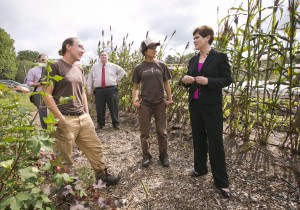
Harden is joined on the tour by Kelly Brownell, back, center, Dean of the Sanford School of Public Policy. Credit: Duke University Photography
This week I had the pleasure of attending a roundtable discussion with Deputy Secretary Krysta Harden of the USDA. It was a lovely discussion and all your favorite agriculture and food systems issues were in attendance: What is the US’s role in the global food trade? How do we improve animal treatment? How do non-farmers break into the ag world? How awesome is the Duke Farm?
Really – she covered it all and we could have a fun 300-word discussion on a variety of topics. But honestly there was one thing that Sec Harden said that jumped out at me.
“This generation has passion and compassion,” she said, then smirked, then nodded, then moved on to less word-smithed statements.
Now, if there is one demographic that does NOT need to be told to be passionate, it’s the students of the Nicholas School of the Environment. Every person in the room has given up salaries, tuition-payments, and the opportunity to live in not-Durham* to come and try to solve a host of intractable unsolvable problems. It’s a lot cheaper to just bang your head against a wall for two years but alas we are here trying to sort this whole mess out. Go team! Go passion!
But her plea for compassion struck me. In the environmental movement we are really bad at being compassionate, especially for the benefactors of unsustainable but profitable activities. No where is that fact more obvious than in agriculture/food systems. In haute-environmentalism, we are all about hating on factory farms, GMOs, industrial fishers – basically anyone who is successfully feeding the masses and making a buck or two at it. (Cue comment section vitriol)
But as a community, we need to be far more compassionate for the people who are making a living in the systems we are trying to rectify. Already in quite a few lectures and group discussions I have heard some scary “us versus them” rhetoric about industries, especially those often considered the enemy of conservation. We need to cut that out, and we need to do it fast.
Now might be the appropriate moment for me to mention that I am dual degree MEM/MBA student so obviously I am biased and somewhat enamored with the power of the private sector. But unless we can foster some more Romeo & Juliet-style love affairs between “us” and “them” we are doomed and it won’t be “their” fault it will be “ours.”
In the next three years I will be taking to my e-soapbox to talk about the many industry solutions that get me psyched about the future of the food industry, mostly the seafood industry. Whether your head is in the clouds or your feet firmly planted in the ocean, I hope you will join me on this fun voyage and will come out the other side rooting for team-industry.
*Jokes! I love Durham. Go Bull City! Go cigarettes!
